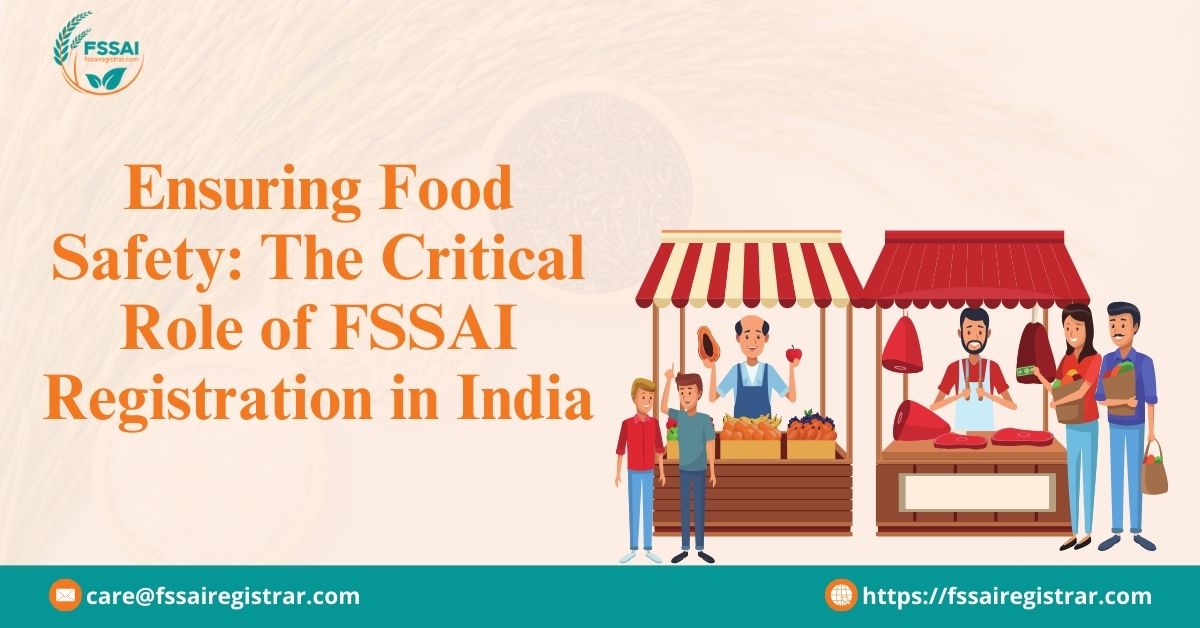Introduction
The food industry in India is one of the largest and most dynamic sectors, contributing significantly to the nation’s economy. However, with the vast array of food products available in the market, ensuring food safety and quality has become paramount. The Food Safety and Standards Authority of India (FSSAI) plays a crucial role in regulating and overseeing food safety in the country. FSSAI registration is not just a legal requirement but a critical step for businesses to establish trust and credibility in the market. This article explores the significance of FSSAI registration, its benefits, and the impact it has on food businesses in India.
What is FSSAI Registration?
FSSAI registration is a mandatory compliance for food-related businesses in India. It involves obtaining a 14-digit registration or license number that must be printed on all food packages. This number is an indicator of a business’s adherence to the standards set by FSSAI, ensuring that the food products are safe for consumption.
The registration process is categorized into three types:
- Basic Registration: For small-scale food businesses with an annual turnover of up to ₹12 lakhs.
- State License: For medium-sized food businesses with an annual turnover between ₹12 lakhs and ₹20 crores.
- Central License: For large-scale food businesses with an annual turnover exceeding ₹20 crores or those involved in exporting or importing food products.
The Importance of FSSAI Registration
FSSAI registration is not merely a regulatory requirement but a crucial aspect of food safety management. It ensures that food products are free from harmful substances, safe to consume, and manufactured in hygienic conditions.
- Legal Requirement: Operating a food business without FSSAI registration is illegal and can lead to severe penalties, including fines and imprisonment.
- Consumer Trust: FSSAI registration enhances consumer confidence in the safety and quality of the food products. The FSSAI logo on packaging serves as a symbol of trust.
- Market Access: FSSAI registration is often a prerequisite for businesses to access certain markets, including online marketplaces, supermarkets, and export markets.
- Regulatory Compliance: It ensures that businesses comply with the food safety regulations laid out by the government, minimizing the risk of legal issues.
- Product Recall: In the event of a food safety issue, registered businesses can efficiently manage product recalls, protecting both consumers and the brand’s reputation.
Unique Aspects of FSSAI Registration: A Focus on Nutraceuticals and Functional Foods
One unique aspect of FSSAI registration is its role in regulating nutraceuticals and functional foods. These are products that provide health benefits beyond basic nutrition, such as fortified foods, dietary supplements, and probiotics. Given the growing consumer interest in health and wellness, the market for these products has expanded rapidly.
FSSAI has set specific guidelines for the registration and regulation of nutraceuticals, ensuring that they are safe, effective, and properly labeled. This includes the approval of health claims made on the packaging, testing of ingredients, and monitoring of manufacturing practices.
- Health Claims: FSSAI strictly regulates health claims made by nutraceutical products. Businesses must provide scientific evidence to support any claims regarding the benefits of their products.
- Ingredient Safety: FSSAI ensures that all ingredients used in nutraceuticals are safe for consumption and do not pose any health risks to consumers.
- Labeling Requirements: Proper labeling of nutraceuticals is crucial for consumer safety. Labels must include detailed information about the ingredients, dosage, and any potential side effects.
- Monitoring and Surveillance: FSSAI conducts regular monitoring and surveillance of nutraceutical products in the market to ensure compliance with safety standards.
The Role of FSSAI in Promoting Food Safety Culture
FSSAI’s role extends beyond just regulation; it also focuses on promoting a culture of food safety in India. This is achieved through various initiatives and campaigns aimed at educating businesses and consumers about food safety practices.
Eat Right India: A flagship initiative by FSSAI, Eat Right India aims to improve public health by encouraging consumers to make healthier food choices and businesses to adopt safe and sustainable food practices.
Food Safety Training and Certification (FoSTaC): FSSAI offers training and certification programs for food handlers and businesses. Emphasizing the importance of hygiene and food safety practices.
Consumer Awareness Campaigns: FSSAI regularly conducts awareness campaigns to educate consumers about food safety, and labeling. And the importance of checking for the FSSAI logo on food products.
Collaboration with Industry Stakeholders: FSSAI collaborates with industry stakeholders, including food businesses, academia, and consumer organizations, to develop and implement best practices in food safety.
Challenges in FSSAI Registration
While FSSAI registration is essential, businesses often face challenges during the process:
Complexity of the Process: The registration process can be complex, especially for small businesses unfamiliar with regulatory procedures.
Documentation Requirements: Gathering and submitting the required documents can be time-consuming and may lead to delays in obtaining the license.
Inspection Delays: FSSAI inspections, while necessary, can sometimes cause delays in the registration process, affecting business operations.
Compliance Costs: The cost of compliance, including registration fees, product testing, and labeling, can be a burden for small businesses.
Note: Click here to re-New your FSSAi License now – FSSAI LICENSE RENEWAL
Conclusion
FSSAI registration is a critical aspect of operating a food business in India. It ensures that food products are safe, of high quality, and compliant with regulatory standards. For businesses, obtaining FSSAI registration not only fulfills a legal requirement but also builds consumer trust, opens up market opportunities, and promotes a culture of food safety.

